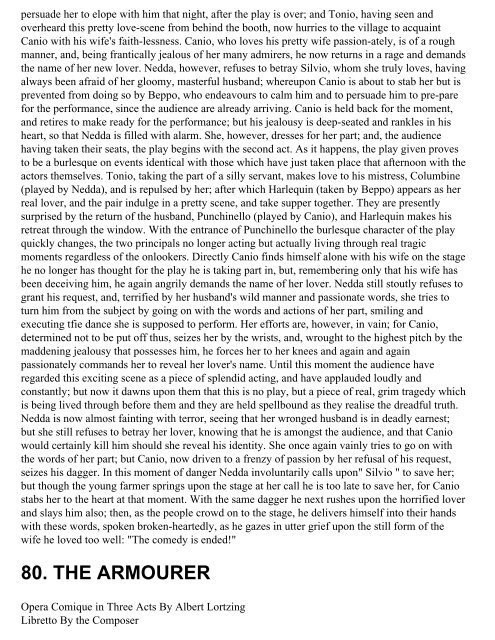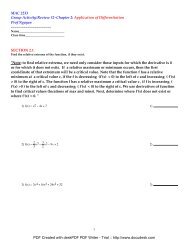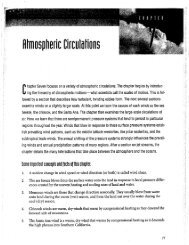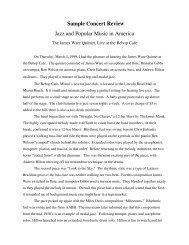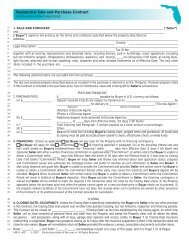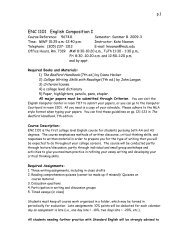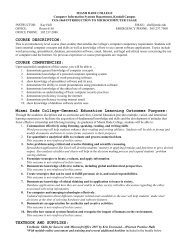Opera Plots I - MDC Faculty Home Pages
Opera Plots I - MDC Faculty Home Pages
Opera Plots I - MDC Faculty Home Pages
You also want an ePaper? Increase the reach of your titles
YUMPU automatically turns print PDFs into web optimized ePapers that Google loves.
persuade her to elope with him that night, after the play is over; and Tonio, having seen and<br />
overheard this pretty love-scene from behind the booth, now hurries to the village to acquaint<br />
Canio with his wife's faith-lessness. Canio, who loves his pretty wife passion-ately, is of a rough<br />
manner, and, being frantically jealous of her many admirers, he now returns in a rage and demands<br />
the name of her new lover. Nedda, however, refuses to betray Silvio, whom she truly loves, having<br />
always been afraid of her gloomy, masterful husband; whereupon Canio is about to stab her but is<br />
prevented from doing so by Beppo, who endeavours to calm him and to persuade him to pre-pare<br />
for the performance, since the audience are already arriving. Canio is held back for the moment,<br />
and retires to make ready for the performance; but his jealousy is deep-seated and rankles in his<br />
heart, so that Nedda is filled with alarm. She, however, dresses for her part; and, the audience<br />
having taken their seats, the play begins with the second act. As it happens, the play given proves<br />
to be a burlesque on events identical with those which have just taken place that afternoon with the<br />
actors themselves. Tonio, taking the part of a silly servant, makes love to his mistress, Columbine<br />
(played by Nedda), and is repulsed by her; after which Harlequin (taken by Beppo) appears as her<br />
real lover, and the pair indulge in a pretty scene, and take supper together. They are presently<br />
surprised by the return of the husband, Punchinello (played by Canio), and Harlequin makes his<br />
retreat through the window. With the entrance of Punchinello the burlesque character of the play<br />
quickly changes, the two principals no longer acting but actually living through real tragic<br />
moments regardless of the onlookers. Directly Canio finds himself alone with his wife on the stage<br />
he no longer has thought for the play he is taking part in, but, remembering only that his wife has<br />
been deceiving him, he again angrily demands the name of her lover. Nedda still stoutly refuses to<br />
grant his request, and, terrified by her husband's wild manner and passionate words, she tries to<br />
turn him from the subject by going on with the words and actions of her part, smiling and<br />
executing tfie dance she is supposed to perform. Her efforts are, however, in vain; for Canio,<br />
determined not to be put off thus, seizes her by the wrists, and, wrought to the highest pitch by the<br />
maddening jealousy that possesses him, he forces her to her knees and again and again<br />
passionately commands her to reveal her lover's name. Until this moment the audience have<br />
regarded this exciting scene as a piece of splendid acting, and have applauded loudly and<br />
constantly; but now it dawns upon them that this is no play, but a piece of real, grim tragedy which<br />
is being lived through before them and they are held spellbound as they realise the dreadful truth.<br />
Nedda is now almost fainting with terror, seeing that her wronged husband is in deadly earnest;<br />
but she still refuses to betray her lover, knowing that he is amongst the audience, and that Canio<br />
would certainly kill him should she reveal his identity. She once again vainly tries to go on with<br />
the words of her part; but Canio, now driven to a frenzy of passion by her refusal of his request,<br />
seizes his dagger. In this moment of danger Nedda involuntarily calls upon" Silvio " to save her;<br />
but though the young farmer springs upon the stage at her call he is too late to save her, for Canio<br />
stabs her to the heart at that moment. With the same dagger he next rushes upon the horrified lover<br />
and slays him also; then, as the people crowd on to the stage, he delivers himself into their hands<br />
with these words, spoken broken-heartedly, as he gazes in utter grief upon the still form of the<br />
wife he loved too well: "The comedy is ended!"<br />
80. THE ARMOURER<br />
<strong>Opera</strong> Comique in Three Acts By Albert Lortzing<br />
Libretto By the Composer


